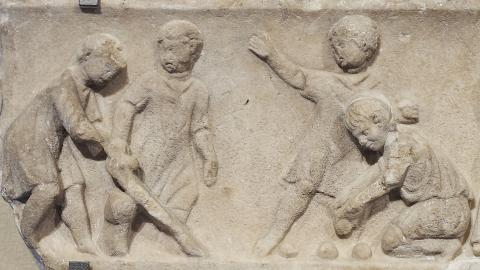Nina Papathanasopoulou
November 29, 2019
The new Classics Everywhere initiative, launched by the SCS in 2019, supports projects that seek to engage communities all over the US and Canada with the worlds of Greek and Roman antiquity in new and meaningful ways. As part of this initiative the SCS has been funding a variety of projects ranging from teaching Latin in a prison to collaborations with artists in theater, music, and dance. In this post we focus on a variety of programs directed to children: summer camps, classics days, after-school programs, and the creation of children-oriented animated videos.
Due to the significant decline in Greek and Latin teaching in US and British schools and the decrease of humanities majors since the financial crisis in 2008, many students finish school with no formal study of Greco-Roman antiquity. Perhaps as a response to this reality, Classics teachers, professors, and departments have increasingly shown an effort in creating enrichment programs that introduce children to the mysterious and fascinating world of the Ancient Mediterranean. The following programs supported by Classics Everywhere provide opportunities for children to experience many aspects of Greco-Roman antiquity hands-on during after-school programs, summer camps, and special days devoted to Classics.
A proponent of introducing young audiences to the language, culture, history, art, literature, and archaeological traditions of the Ancient Mediterranean, William Aylward, Chair of the Department of Classical and Ancient Near Eastern Studies (CANES), and the Language Institute at the University of Wisconsin-Madison, organized for the second summer in a row a two-week Classics day camp for middle school children in the greater Madison area. Classics Camp for Youth provides hands-on and highly interactive learning and includes an introduction to Greek and Latin; Classics-themed art projects; creative renditions of classical myth and drama; lessons in history, literature, and archaeology; and participation in games from the ancient world. It also features field trips to Madison’s Chazen Museum of Art, Helen Louise Allen Textile Collection, and even the Camp Randall football stadium to experience a modern version of the Roman arena first-hand.
Classics Camp for Youth stands out for being one of the only humanities-focused summer youth programs offered on the UW-Madison campus. It also attracts a diverse group of students, including many who aspire to become first-generation college students. This year’s 30 students came from a mix of public and private schools, and due to the support of the SCS’ Classics Everywhere Initiative, two students from economically disadvantaged backgrounds received free tuition. Next year the camp plans to run for 2 two-week sessions, offering the opportunity to twice as many students to attend.
For Aylward, the success of the camp is twofold: UW-Madison is able to conduct outreach and enrich the learning of their region’s middle school students, many of whom are experiencing the study of Greco-Roman antiquity for the first time. It also provides teaching opportunities and summer employment for their own UW students. Mary Claire La Velle, a PhD candidate in Classics, was hired to be this year’s camp lead teacher, and three undergraduate students received internship credit by participating in the organization of the camp.
The camp also intertwined literature, art, and reconstructive archaeology. Highlights from this year’s summer camp include a scavenger hunt at Chazen Art Museum where students had to use Ovid’s Metamorphoses as their guide to follow clues in the paintings; creating and writing in wax tablets in Latin; making togas by using the textile collection and learning how to wear them; a lecture on ancient monsters by Associate Professor of Classics William Brockliss; and a lecture on underwater archaeology and shipwrecks by Aylward himself.
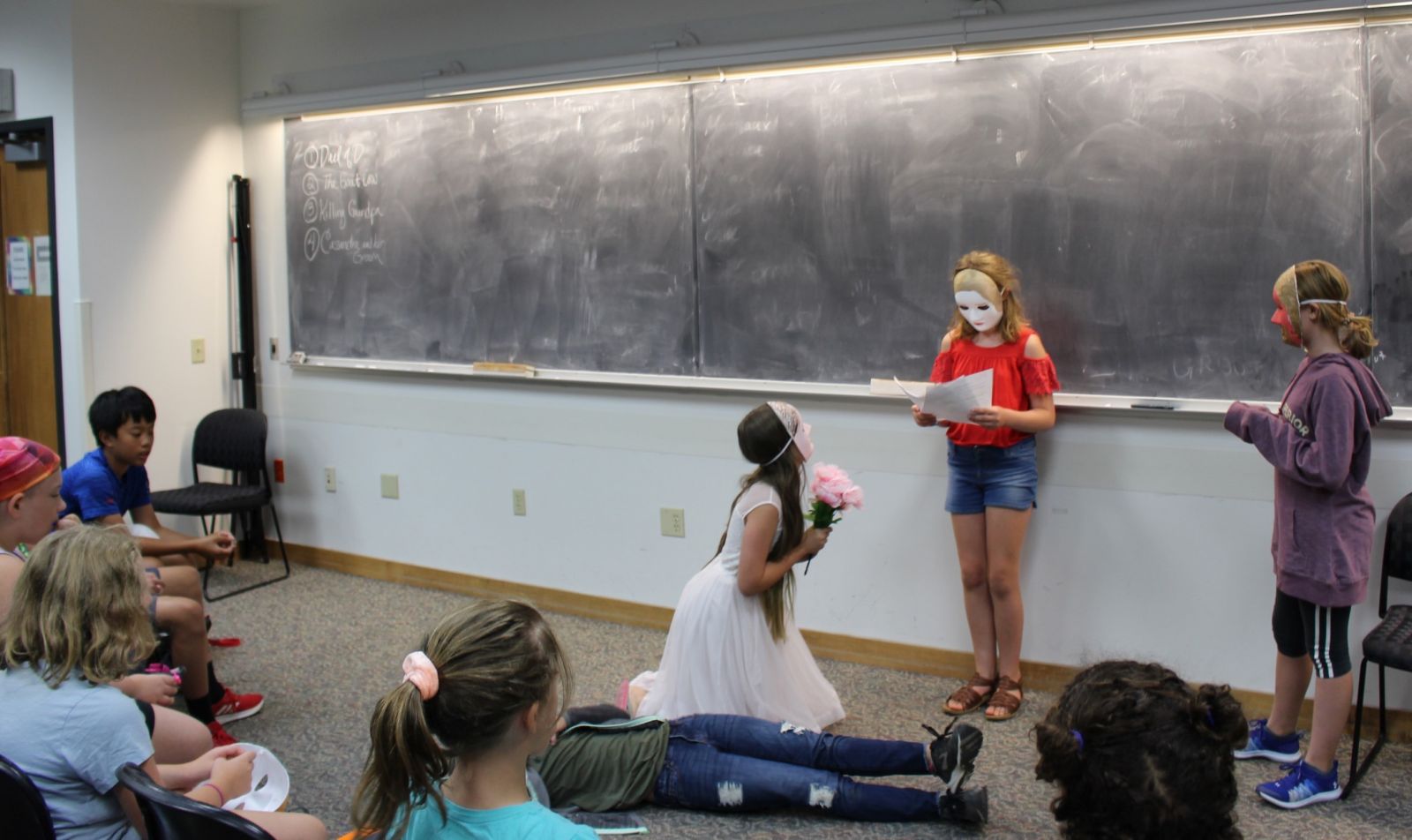
Photo 1: Classics Camp for Youth campers show off their drama skills in skits wearing masks they made to represent their favorite characters from myths of the ancient Greeks and Romans.
In organizing the camp, Aylward benefited greatly from the work and support of Associate Professor of Classics at the University of Illinois at Urbana-Champaign Ariana Traill. Traill had had experience running a Classics summer camp in Illinois and collaborated with Aylward to organize a roundtable about classics camps during the SCS annual meeting in San Diego. For this year’s camp, Aylward noted:
We are very pleased about this opportunity to raise awareness about Classics in our community, to broaden the reach and diversity of our discipline, and to share in the opportunities and rewards of studying classical antiquity. The camp provides a high-impact, two-week campus experience focused on children ages 10-15, and includes elementary instruction in Ancient Greek and Latin. We are also glad that the camp offers paid professional development opportunities and internships to instructional staff drawn from graduate students in Classics and undergraduate majors in Classics and related fields on campus. The Classics Everywhere initiative helped us achieve these goals.
Introducing secondary school children to the opportunities of studying Classics in college is also one of the goals of Evelyn Adkins, Assistant Professor of Classics at Case Western Reserve University (CWRU) in Ohio. In September of 2019, Adkins along with her co-coordinator, Senior Lecturer in Classics at CWRU Timothy Wutrich, planned a day devoted to Classics for students and teachers in the Cleveland area. Classics Day 2019 fostered connections between the wider metropolitan area and suburbs of Cleveland and University Circle, a hub of educational and cultural institutions in Cleveland including CWRU and the Cleveland Museum of Art.
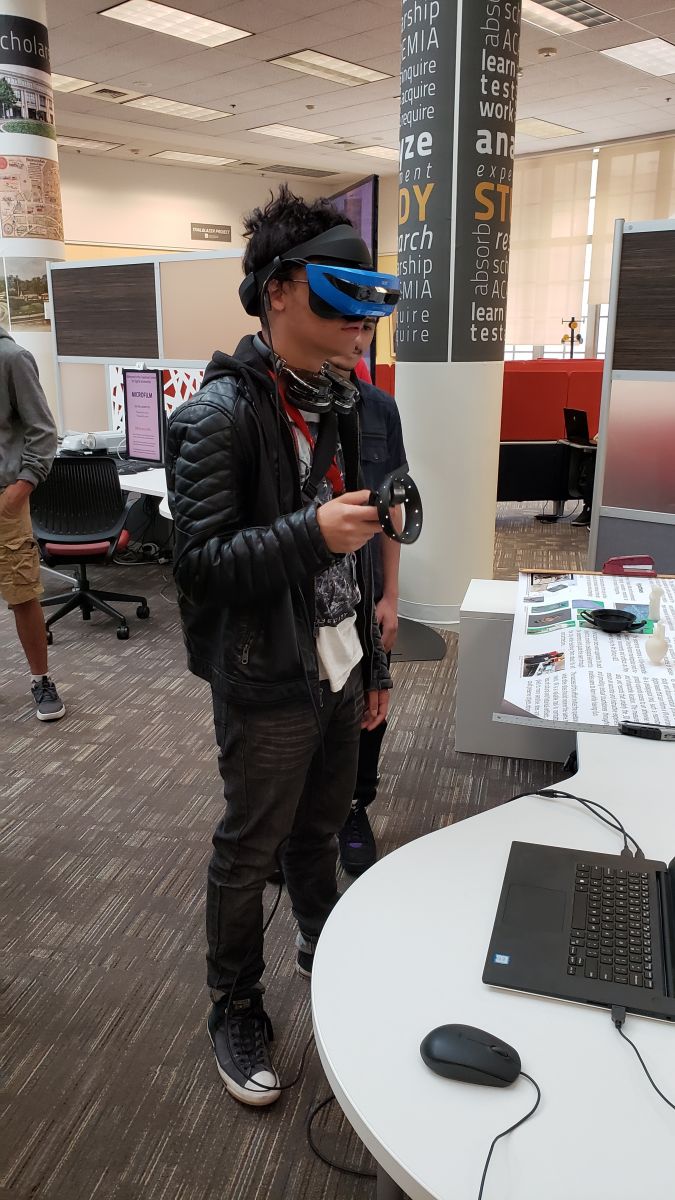
Photo 2: A student from Bard High School Early College explores a Hellenistic agora using virtual reality in the CWRU Freedman Center for Digital Scholarship. Photo by Christian Lehmann.
Almost 100 high school students from 5 schools participated in the variety of activities that were planned for the day: guided tours at the Cleveland Museum of Art by CWRU professors and the curator of Greek and Roman Art, Seth Pevnick; hands-on sessions on Greek and Roman artifacts with Seth Pevnick; a museum scavenger hunt in Latin; a workshop to make your own Roman stola (a traditional garment for women); a Classics jeopardy game organized by the CWRU Classics Club Atlantis; and a virtual reality walking simulator where students experienced walking through the Hellenistic Agora at Morgantina in Sicily. The simulator was put together by R. Benjamin Gorham, a Classical Archaeologist working in digital humanities.
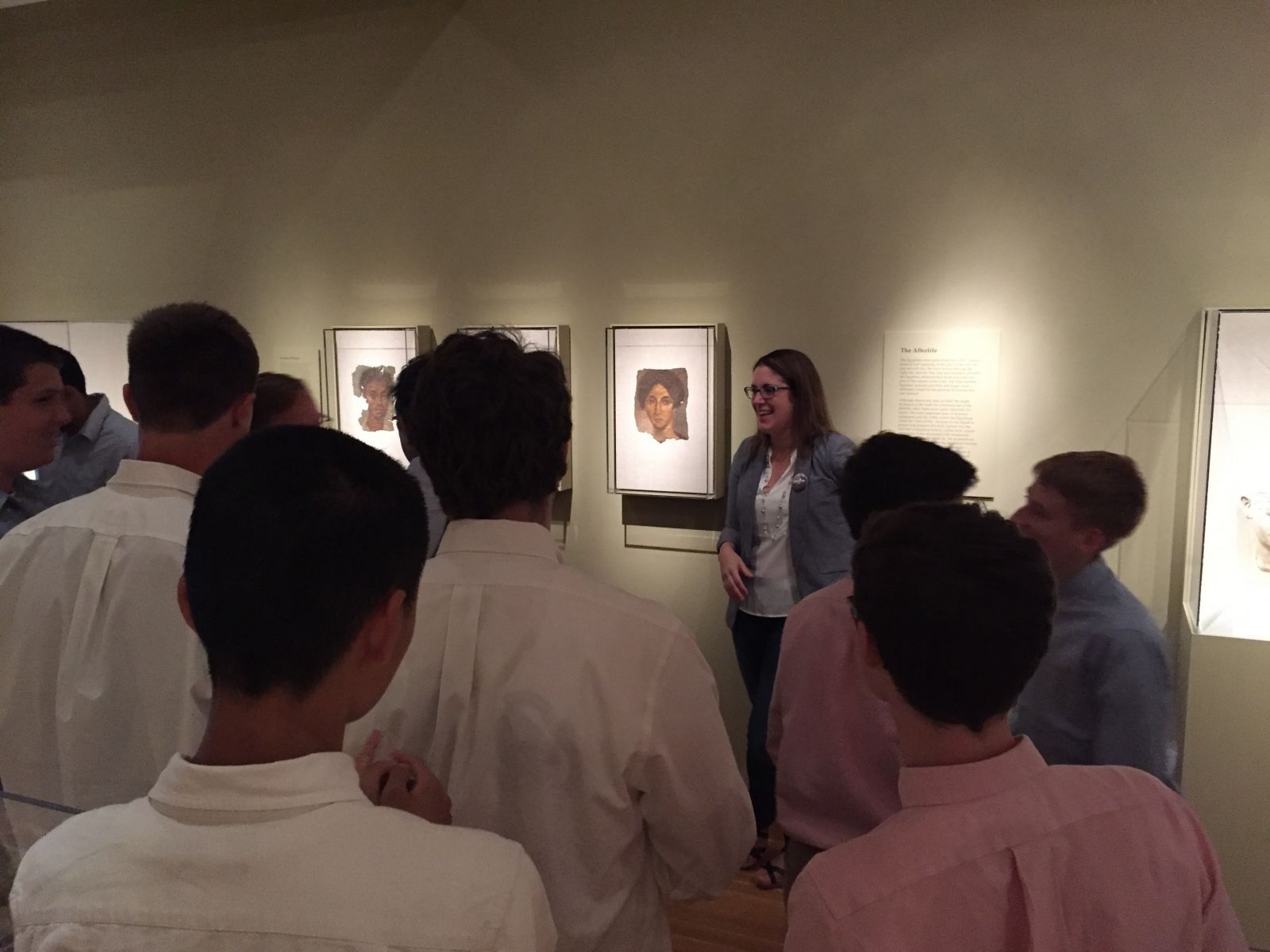
Photo 3: Dr. Meghan Strong (Adjunct Professor in Classics, CWRU) leads a tour on “Death and the Afterlife in Ancient Egypt” in the Cleveland Museum of Art. Photo by Evelyn Adkins.
For Adkins, Classics Day was and is a unique opportunity to get to meet teachers of Classics across Northeast Ohio and others with similar interests. Students get a first taste of college and of the endless possibilities they may have there, especially if interested in the ancient world. CWRU students are also given the opportunity to explore career interests in K-12 education by interacting with local teachers and students. Adkins was so pleased to see how “enthusiastic in their love for Classics” the students were. She reported that one of her day’s highlights was “watching one of our visiting students give an impromptu performance of Cicero’s First Catilinarian – in Latin! – for his classmates and teachers.”
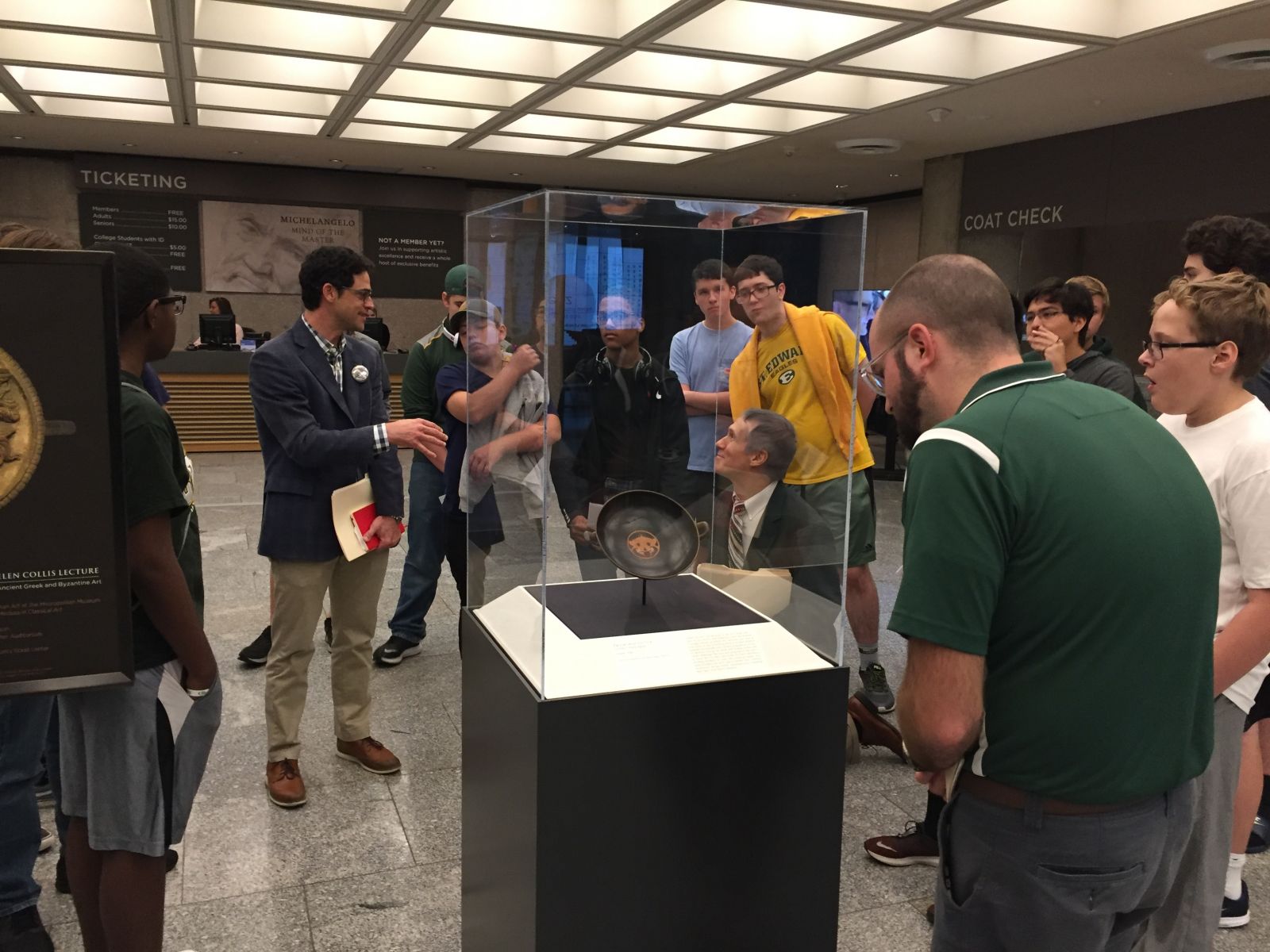
Photo 4: Seth Pevnick, Curator of Greek and Roman Art at the Cleveland Museum of Art leads a tour on “Greek Vases” in the CMA for students from St. Edward High School. Photo by Evelyn Adkins.
The day was funded by the SCS, the Baker-Nord Center of the Humanities and the Department of Classics at CWRU, and the Cleveland Museum of Art. Most of the funding went to materials for the stola workshop, and lunches for all the students, teachers, faculty, staff, and volunteers who participated and helped run the events.
Exposing historically under-represented groups to the study of Classics and enriching children’s education with interactive and fun activities is a pivotal goal of Classics Everywhere. This passion is shared by University of Colorado at Boulder’s Andrew Cain, Professor of Classics, and Reina Callier, Lecturer in Classics and Latin Coordinator. The two of them have been coordinating a Classics after-school program at Casey Middle School in Boulder, CO. The program is in its second year and provides activities centered on Greek Mythology, Roman Culture, and Latin to about 10 middle school students on a weekly basis. Graduate and undergraduate students from UC-Boulder volunteer to teach in the program, a rewarding and instructive experience for them, as many are aspiring to become Classics teachers at the secondary level when they finish their degrees.
One of the program’s main goals is to increase literacy through Latin. Consequently, many activities focus on using Latin to further develop the children’s English vocabulary. The students have been impressively receptive so far and are eagerly asking for more challenging material. Callier, who is supervising the program this year, spoke of its many benefits:
I am so happy to be involved with this classical outreach program, because it gives us a chance to show students how useful and interesting Classics can be. You can see the excitement on their faces as they make connections to their own lives and their own language! I hope that the benefits of learning about Latin and ancient culture will have a positive effect not only the students we see in the classroom but also on administrations who might be considering adding Latin to their curriculum.
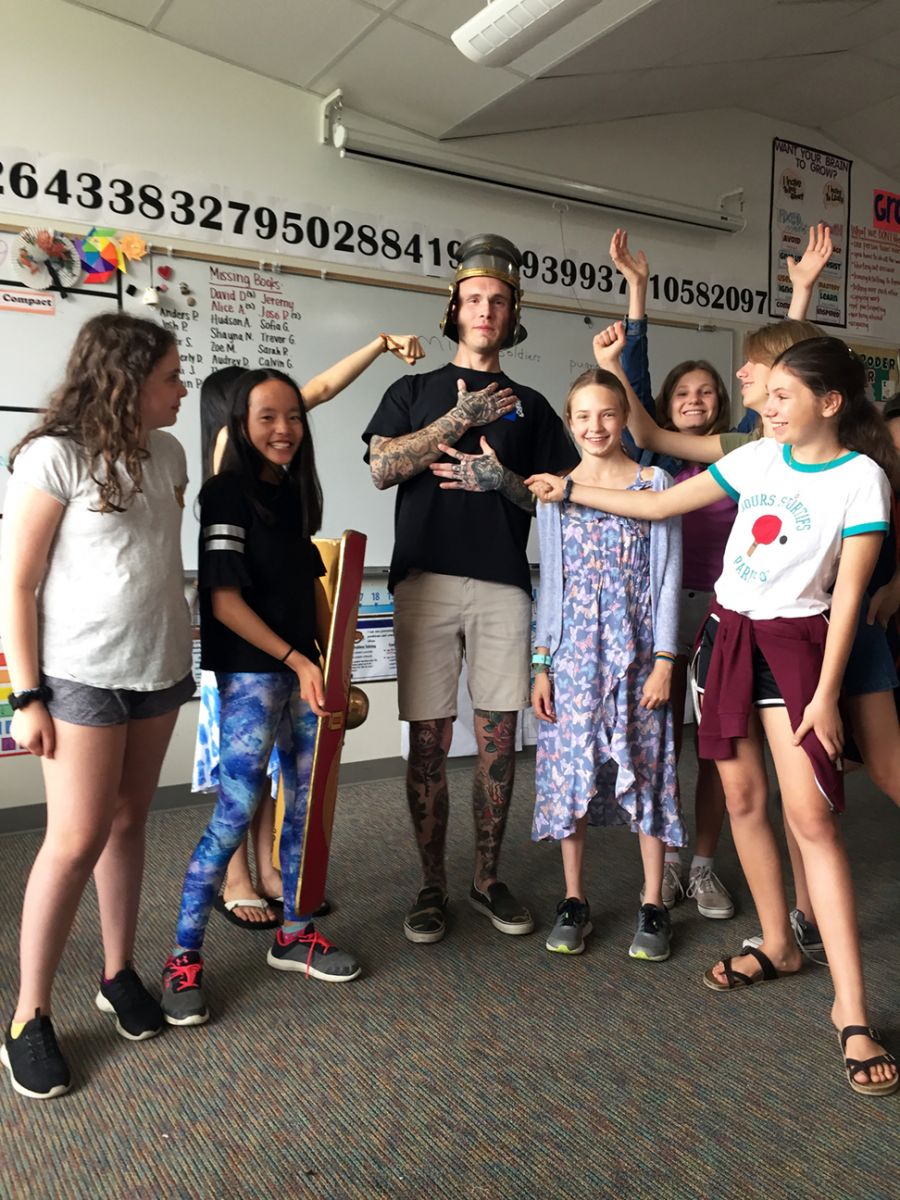
Photo 5: Students participating in the Classics Outreach program at Casey Middle School in Boulder, CO.
The universal appeal of the Ancient World can also be seen in more global efforts. Four siblings of Filipino, Chinese, and Italian descent now being raised in Belgium—Sofia (age 18), Raffaello (15), Pieraugusto (13) and Teodoro Poinelli (12)—have been making a series of YouTube videos on the cultures of Ancient Greece and Rome called Jkids – Bits of Classics and History. Inspired by their mother’s stories on Greco-Roman antiquity, and her encouragement to read Plutarch as way to expand their English vocabulary when they were young, all four kids were intrigued by the cultures of Ancient Greece and Rome.
Believing that more kids should be exposed to this material, the Poinelli children made use of the platform powtoon, and acquired support from the SCS for its subscription. As a result, they have now made 34 videos about Ancient Greece and are now in the process of making their 11th video for Rome. Teodoro, the youngest of the four kids, is particularly tech-savvy and has done most of the graphic work for the videos. Sofia’s favorite is Three Mathematicians in Ancient Greece; they also have videos based on Knock-Knock jokes. Having just started college at NYU Tandon School of Engineering, Sofia is now excited to take a philosophy or ancient history course and learn more about some of her favorite figures.
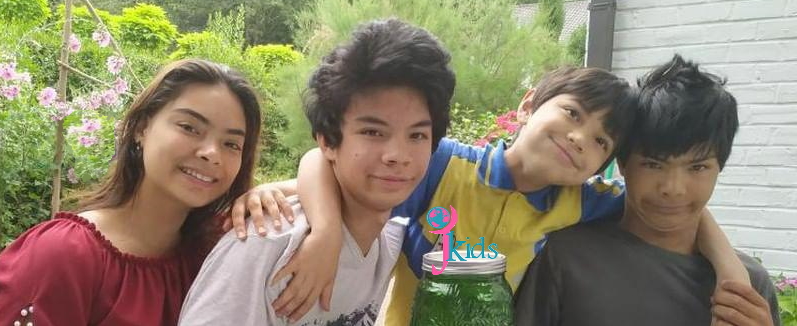
Photo 6: The Jkids team. From left to right: Sofia, Raffaello, Teodoro and Pieraugusto. Photo by Sofia Poinelli.
When I ask my college students why they decided to take a course in Classics, most of them respond that they loved reading the stories of the Greeks and Romans when they were children or that they enjoyed learning Latin in secondary school. Providing opportunities to introduce these cultures and others within the Ancient Mediterranean to students of younger ages is crucial: by doing so we introduce them to the fascinating stories, artwork, language, and humanity of ancient culture while fostering their creativity and love of learning.
We are also making them interested to study this material with a critical mind in the future. As the above programs demonstrate, instructors benefit from children’s programs as much as the students do: they are challenged to find simple and interactive ways to engage with the material they study, often rediscovering their own fascination with antiquity. Former President of South Africa, Nelson Mandela, famously said “There can be no keener revelation of a society’s soul than the way in which it treats its children.” Indeed, to create responsible citizens of the world, children need to be given many opportunities for engaging with the past and with global cultures other than their own in order to expose them to a rich and cosmopolitan world of human experience.
The next round of applications for Classics Everywhere grants is due February 14, 2020 and you can apply here.
Authors
